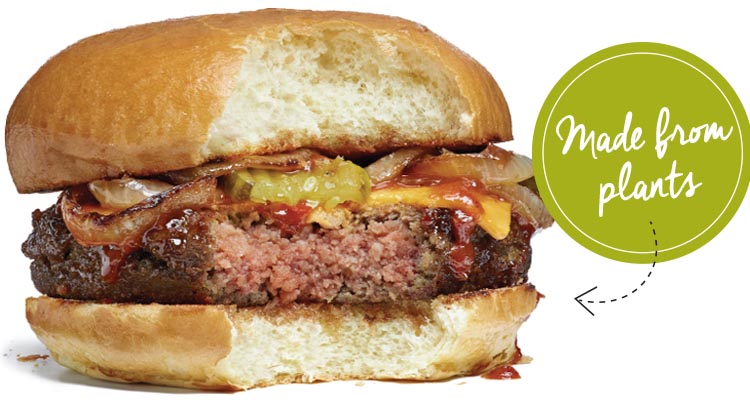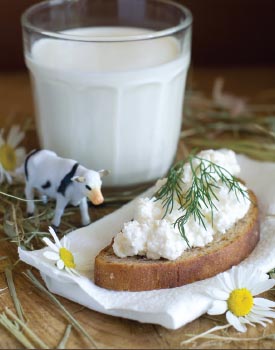The future of meat?
by Michele Simon, JD, MPH
This article was originally published in May 2015

High-tech startups are aiming to revolutionize the food system by creating meat, egg and dairy substitutes derived from plant compounds or cultured animal tissue. They can expect legal and political obstacles.
Growing more and more animals for food is unsustainable. The World Health Organization predicts that global annual meat production will increase from 218 million tons in 1998 to 376 million tons by 2030. That uptick will bring with it numerous negative consequences, including deforestation, manure contamination of air and water, and excessive use of water and harmful energy sources, not to mention contributions to climate change.
Recognizing this problem, food startups backed by significant venture capital are hoping to create animal food products without animals. The goal: provide an alternative to the confined animal food production model — a model that wreaks havoc on the environment, public health and animal welfare.
As a new wave of products aiming to mimic meat, eggs and dairy comes to mainstream supermarkets, what started in the lab soon will make its way to the political arena.
The new science of food
For now, most of these startups are focused on science, not politics, and they’re reinventing animal-based food.
These companies aren’t using ingredients previously used in meat and dairy substitutes such as soy protein, wheat gluten and vegetable starches. Some are using computer algorithms to analyze hundreds of thousands of plant species to discover what compounds can be extracted and recombined to make what they say are more tasty and sustainable sources of protein. Other companies creating cultured meat are using tissue engineering technology developed for medical purposes, such as growing skin and organs.
One such company, with aspirations of building a better burger, is Impossible Foods . Started by Patrick Brown, a Stanford University biologist, and backed by $75 million, Impossible Foods says it’s “developing a new generation of meats and cheeses made entirely from plants.”
Brown, who calls conventional livestock “an antiquated technology,” has unlocked certain properties from the molecule found in plant hemoglobin that make blood red and gives steak its flavor. It’s hard to tell from the image above that Impossible Foods’ “cheeseburger” contains no beef or cheese. Depending on how the company positions its products, it could face challenges from the meat industry claiming it is fooling consumers.
The startup Modern Meadow , which has raised $10 million , is tackling the longer-term challenge of cultured meat: creating meat from animal cells. So far, it’s avoiding the complex regulatory hurdles for meat by starting with ” cultured leather ” to get consumers on board.
The big question these businesses face is, how will the U.S. Department of Agriculture (USDA) or the Food and Drug Administration (FDA) handle animal-free meat? Will food safety regulations associated with beef and poultry production apply to cultured meat? How will such products be labeled? The meat industry likely will lobby to see them rejected altogether, or put up barriers that could delay or even halt getting them to market.
Another huge challenge for cultured meat will be consumer perception. Modern Meadow CEO, Andras Forgacs, told The Guardian , “People have really strong opinions about food, especially when it comes to new technologies.” He rightly plans to be open about the process. “The more consumers understand how we do what we do … the more transparency, the more labeling, the better, as far as I’m concerned.”

Cow-free
Hoping to take over the dairy aisle without cows are a couple of young scientists just setting up their lab, thanks to a jump start from the nonprofit New Harvest , which led to a $2 million investment from Horizon Ventures, a Hong Kong-based capital firm led by billionaire Li Ki-Shing. (Horizon also is investing in Hampton Creek, Impossible Foods and Modern Meadow.)
Muufri (pronounced “moo-free” — get it?) intends to create a cow-free version of milk that, according to the company, “tastes just like animal-produced milk.” Ryan Pandya, one of Muufri’s co-founders, told me the company expects the result to be used in common dairy products, such as cheese, ice cream and yogurt. When I asked if he has thought about the potential legal and political hurdles, he said, “We think about it every day.”
The dairy industry is just as formidable as the meat lobby. The National Milk Producers Federation has petitioned the FDA twice to bar nondairy milks from being able to use the word “milk” and has complained that products labeled “soy yogurt” and “dairy-free ice cream” are misbranded and, therefore, illegal. Big Dairy is likely to take even more aggressive steps to stop cow-less milk, perhaps blocking FDA approval.
Another plant-based newcomer with big aspirations (and funding ) is Beyond Meat, which makes a convincing chicken substitute, as well as ground beef, made from pea protein. CEO Ethan Brown is aiming for Middle America. “It has to be just as good as, just as convenient as and maybe even cheaper than ground beef or chicken,” he told The New York Times . “Our business is to create something better than meat; otherwise we are not going to move the needle.”
Impossible Foods’ Patrick Brown put it more bluntly, saying, “We want the hard-core beef lovers.” The more “new meat” reaches that consumer, the more threatened Big Meat will become.
Outdated regulations
One clue for how the meat and dairy lobbies may respond to these new foods lies in Unilever’s lawsuit against San Francisco startup Hampton Creek over the definition of mayonnaise.
Unilever, the consumer goods behemoth, argues Hampton Creek’s eggless Just Mayo, made from protein extracted from the Canadian yellow pea, violates the FDA’s standard of identity for mayonnaise, which requires eggs. But that definition is from 1957 , well before the recent wave of egg-free mayonnaise-like products came on the market.
Such outdated food regulations could create similar barriers for other plant-based products that are being positioned as analogs to their animal counterparts. High-tech inventions, such as cultured meat and dairy products, are likely to face even more significant regulatory hurdles, especially since they won’t be identical to the foods they are replacing. The companies are aiming to create foods that not only are more sustainable but also improve the nutritional profiles.
Federal nutrition labeling regulations assume some uniformity within each meat category. What happens when the “new meat” doesn’t fit those profiles?
Such challenges represent a significant shift in the role of meatless and dairy-free product competitors in the marketplace.
Yesterday’s vegetarian and vegan products were relegated to a niche market and sold mainly in natural food stores; they didn’t try to precisely mimic animal foods. In contrast, these new startups are aiming for the mainstream market, which sets a higher bar. Hampton Creek never intended Just Mayo to be a vegan alternative to mayonnaise; it positioned its product as the real deal, and that’s why Unilever got so mad.
The future could bring lawsuits and the erection of regulatory hurdles, such as the silly law that recently got the vegetarian non-meat company, Field Roast, kicked out of Canada. Negative public relations campaigns could ensue, such as the one the egg industry initiated to cast shade on egg-replacement competitors.
The Unilever lawsuit against Hampton Creek could look like child’s play compared with what awaits the high-tech animal-free meat, egg and dairy industry.
But these mission-driven companies are likely to adopt Hampton Creek CEO Josh Tetrick’s response to the challenge: “Bring it on!”
High-tech food startups
— from the editors
Hampton Creek — Produces an egg replacement derived from the Canadian yellow pea. Its products include Just Mayo (sold at PCC) and Just Cookie Dough. The company maintains a database of thousands of species of plants and uses a proprietary algorithm to analyze the likely properties of species, such as viscosity or ability to emulsify. It’s currently studying possible sugar substitutes.
Clara Foods — Working to develop animal-free egg whites using cultured egg white cells.
Modern Meadow — Uses 3-D printers and “tissue engineering” to grow meat in a lab. Tissue engineering already has been applied to make tissues and organs that can mimic or regrow lost body parts. Modern Meadow is using the technology to create “leather.” It’s working to produce cultured meat from muscle, fat and other cells.
Beyond Meat — Produces plant-based chicken and beef substitutes sold at PCC. Ingredients include soy and pea protein isolates, amaranth and canola oil.
Impossible Foods — The company’s scientists say they “looked at animal products at the molecular level, then selected specific proteins and nutrients from greens, seeds, and grains to recreate the wonderfully complex experience of meats and dairy products.” Impossible’s burger patties look like real meat because they have heme, a molecule found in animal blood — but the heme in Impossible’s burgers is extracted from the roots of legume plants.
Muufri — Muufri’s bioengineers insert DNA sequences from cattle into yeast cells, grow the cultures, then harvest milk proteins. They say they’re combining “six key proteins for structure and function” and “eight key fatty acids for flavor and richness” to “make milk that tastes and functions just like animal-produced milk.”
Michele Simon is president of Eat Drink Politics, the author of “Appetite for Profit: How the Food Industry Undermines Our Health and How to Fight Back” and an attorney with the food law firm, Foscolo and Handel.
